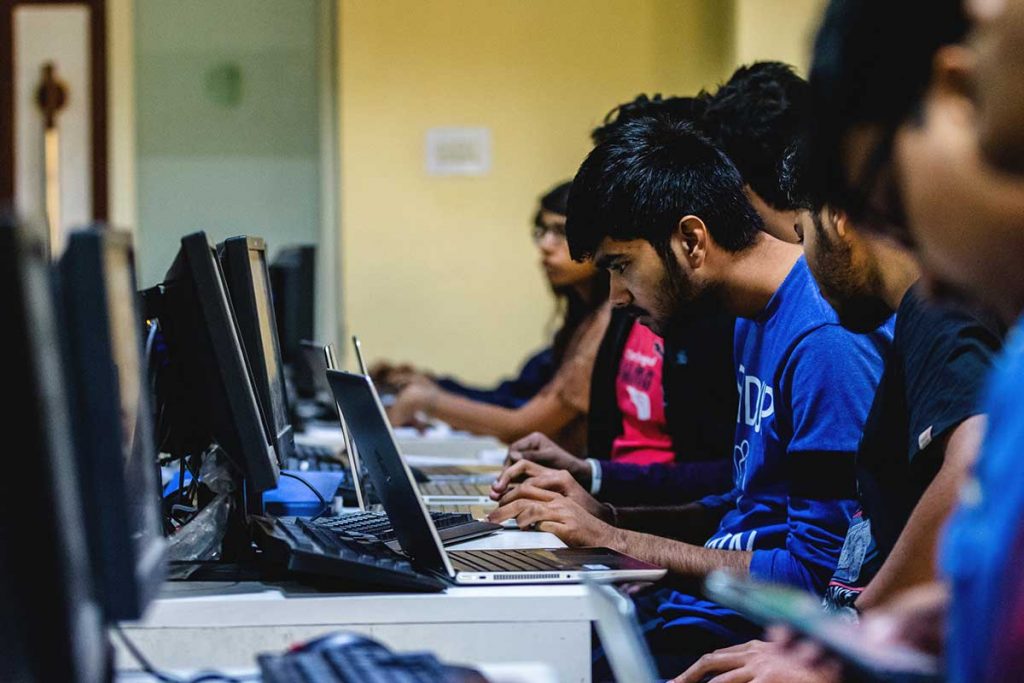Academic Programmes

Under Graduate Programmes
Bachelor in Computer Applications (3 years)
Eligibility Criteria:
- Pass in 10+2 in any stream with at least 50% marks and having Mathematics as one of the subjects in 10+2 level.
- Should have born on or after 01.07.1999.
Program Educational Objectives (PEOs)
- Pursue a successful career in the field of computer applications and contribute to the industry or undertake entrepreneurial endeavors.
- Perceive the limitations and impact of technical /IT solutions in social, legal, commercial and multidisciplinary contexts.
- Demonstrate professional and ethical responsibilities, and engage in life-long learning.
Program Outcomes (POs)
- Learn the fundamentals of mathematics and computer science.
- Design simple solutions using concepts of data structure and algorithms.
- Solve problems and formulate simple solutions using mathematics and computer programming.
- Apply the concepts of software engineering to build simple projects.
- Create, select, and apply appropriate techniques using modern IT tools.
- Apply soft skills appropriately in professional domain.
- Understand the impact of the professional solutions in societal and environmental contexts.
- Commit to professional ethics and apply ethical principles and norms of the software professional practices.
- Work effectively as an individual, and as a member or team leader in diverse roles.
- Communicate effectively on technical activities with the community.
- Effectively write reports, prepare documentation and make effective presentations.
- Demonstrate knowledge and understanding of the software and management principles and apply these to one’s own work.
Program Specific Outcomes (PSOs)
- Ability to use knowledge of financial accounting to estimate the profitability of small projects.
- Design simple software solutions for real-life problems.
- Engage in lifelong learning.
B.Sc. Computer science (4years)
Eligibility Criteria:
- Pass in 10+2 Science stream with at least 50% marks and having Mathematics as one of the subjects in 10+2 level.
- Should have born on or after 01.07.1999.
Program Educational Objectives (PEOs)
- Pursue a successful career in the field of computer science and contribute to the industry or undertake entrepreneurial endeavors.
- Perceive the limitations and impact of technical /IT solutions in social, legal, commercial and multidisciplinary contexts.
- Demonstrate professional and ethical responsibilities, and engage in life-long learning.
Program Outcomes (POs)
- Learn the fundamentals of mathematics and computer science.
- Design simple solutions using concepts of data structure and algorithms.
- Solve problems and formulate simple solutions using mathematics and computer programming.
- Apply the concepts of software engineering to build simple projects.
- Create, select, and apply appropriate techniques using modern IT tools.
- Apply soft skills appropriately in professional domain.
- Understand the impact of the professional solutions in societal and environmental contexts.
- Commit to professional ethics and apply ethical principles and norms of the software professional practices.
- Work effectively as an individual, and as a member or team leader in diverse roles.
- Communicate effectively on technical activities with the community.
- Effectively write reports, prepare documentation and make effective presentations.
- Demonstrate knowledge and understanding of the software and management principles and apply these to one’s own work.
Program Specific Outcomes (PSOs)
- Ability to use knowledge of financial accounting to estimate the profitability of small projects.
- Design simple software solutions for real-life problems.
- Engage in lifelong learning.
Post Graduate Programs
Master in Computer Application 2 Years Program
Program Educational Objectives (PEOs)
They are expected to accomplish the following objectives in a few years after MCA graduation:
PEO-I: Pursue a successful career in the field of computer applications, contribute significantly to their profession in industry, research and academia or undertake entrepreneurial endeavours.
PEO-II: Continuously learn, engage and update themselves to carryout independent or collaborative research, and address constantly evolving technological and global challenges in their field of expertise.
PEO-III: Develop leadership skills and demonstrate professional, social and ethical responsibilities as an individual.
List the Course Outcomes (COs) and Programme Outcomes (POs)
Programme Outcomes (POs)
Master of Computer Applications (MCA) programme is designed to ensure that each student acquires the desired competencies and on successful completion of the programme, the students are expected to:
PO1. Computational knowledge: Apply the knowledge of mathematics and computer fundamentals to solve real life problems.
PO2. Problem analysis: Identify, formulate, review research literature, and analyze complex problems in their program of study using knowledge of mathematics and computer science.
PO3. Design/development of solutions: Design solutions for complex problems and design software components that meet the specified needs with appropriate consideration for the public health and safety, cultural, societal, and environmental considerations.
PO4. Conduct investigations of complex problems: Use application-based knowledge and research methods including design of experiments, analysis and interpretation of data, and synthesis of the information to provide valid conclusions.
PO5. Modern tool usage: Create, select, and apply appropriate techniques, resources, and modern IT tools to model complex solutions with an understanding of their limitations.
PO6. The professional and society: Apply reasoning informed by the contextual knowledge to assess societal, health, safety, legal and cultural issues and the consequent responsibilities relevant to the professional practice.
PO7. Environment and sustainability: Understand the impact of the professional solutions in societal and environmental contexts, and demonstrate the knowledge of, and need for sustainable development.
PO8. Ethics: Apply ethical principles and commit to professional ethics and responsibilities and norms of the software professional practices.
PO9. Individual and team work: Function effectively as an individual, and as a member or leader in diverse teams, and in multidisciplinary settings.
PO10. Communication: Communicate effectively on complex technical activities with the community and with society at large, write and present substantial technical reports/ documents, and give and receive clear instructions.
PO11. Project management and finance: Demonstrate knowledge and understanding of the software and management principles and apply these to one’s own work, as a member and leader in a team, to manage projects and in multidisciplinary environments.
PO12. Life-long learning: Recognize the need for, and have the preparation and ability to engage in independent and life-long learning in the broadest context of technological change.
PROGRAM SPECIFIC OUTCOMES (PSOs)
PSO1. Ability to demonstrate a degree of mastery in the area of computer applications through the advanced knowledge of data acquisition, data analytics, big data, pattern recognition and knowledge discovery.
PSO2. Ability to independently carry out research/investigation and developmental work to solve practical problems.
PSO3. Develop sound knowledge and skill sets to develop and expand professional careers in fields related to human-computer interaction and management of industrial processes for the design and implementation of intelligent systems.
M.Sc. Computer Science (2 years)
Eligibility Criteria:
- Candidates must have B.Sc degree in Computer Science / IT /Mathematics /Electronics /Physics /Chemistry /BCA with minimum 50% aggregate marks.
Program Educational Objectives (PEOs)
They are expected to accomplish the following objectives in a few years after M.Sc. (CS) graduation:
PEO1: Pursue a successful career in the field of computer applications, contribute significantly to their profession in industry, research and academia or undertake entrepreneurial endeavours.
PEO2: Continuously learn, engage and update themselves to carryout independent or collaborative research, and address constantly evolving technological and global challenges in their field of expertise.
PEO3: Develop leadership skills and demonstrate professional, social and ethical responsibilities as an individual.
List the Course Outcomes (COs) and Programme Outcomes (POs)
Programme Outcomes (POs)
Master of Science in Computer Science programme is designed to ensure that each student acquires the desired competencies and on successful completion of the programme, the students are expected to:
PO1: Computational knowledge: Apply the knowledge of mathematics and computer fundamentals to solve real life problems.
PO2: Problem analysis: Identify, formulate, review research literature, and analyze complex problems in their program of study using knowledge of mathematics and computer science.
PO3: Design/development of solutions: Design solutions for complex problems and design software components that meet the specified needs with appropriate consideration for the public health and safety, cultural, societal, and environmental considerations.
PO4: Conduct investigations of complex problems: Use application-based knowledge and research methods including design of experiments, analysis and interpretation of data, and synthesis of the information to provide valid conclusions.
PO5: Modern tool usage: Create, select, and apply appropriate techniques, resources, and modern IT tools to model complex solutions with an understanding of their limitations.
PO6: The professional and society: Apply reasoning informed by the contextual knowledge to assess societal, health, safety, legal and cultural issues and the consequent responsibilities relevant to the professional practice.
PO7: Environment and sustainability: Understand the impact of the professional solutions in societal and environmental contexts, and demonstrate the knowledge of, and need for sustainable development.
PO8: Ethics: Apply ethical principles and commit to professional ethics and responsibilities and norms of the software professional practices.
PO9: Individual and team work: Function effectively as an individual, and as a member or leader in diverse teams, and in multidisciplinary settings.
PO10: Communication: Communicate effectively on complex technical activities with the community and with society at large, write and present substantial technical reports/ documents, and give and receive clear instructions.
PO11: Project management and finance: Demonstrate knowledge and understanding of the software and management principles and apply these to one’s own work, as a member and leader in a team, to manage projects and in multidisciplinary environments.
PO12: Life-long learning: Recognize the need for, and have the preparation and ability to engage in independent and life-long learning in the broadest context of technological change.
PROGRAM SPECIFIC OUTCOMES (PSOs)
PSO1: Ability to demonstrate a degree of mastery in the area of computer applications through the advanced knowledge of data acquisition, data analytics, big data, pattern recognition and knowledge discovery.
PSO2: Ability to independently carry out research/investigation and developmental work to solve practical problems.
PSO3: Develop sound knowledge and skill sets to develop and expand professional careers in fields related to human-computer interaction and management of industrial processes for the design and implementation of intelligent systems.

